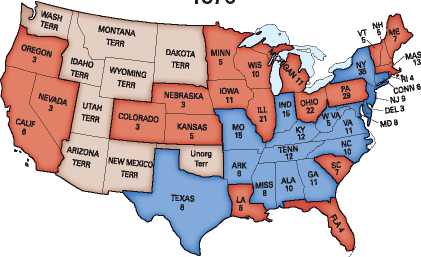Against this background the presidential election of 1876 took place. Since corruption in government was the most widely discussed issue, the Republicans passed over their most attractive political personality, the dynamic James G. Blaine, Speaker of the House of Representatives, who had been connected with

MINOR
1%
93,891

POPULAR VOTE
TOTAL: 8,340,783

ELECTORAL VOTE
TOTAL: 369
Some chicanery involving railroad securities. Instead they nominated Governor Rutherford B. Hayes of Ohio, a former general with an untarnished reputation. The Democrats picked Governor Samuel J. Tilden of New York, a wealthy lawyer who had attracted national attention for his part in breaking up the Tweed Ring in New York City.
In November early returns indicated that Tilden had carried New York, New Jersey, Connecticut, Indiana, and all the southern states, including Louisiana, South Carolina, and Florida, where Republican regimes were still in control. This seemed to give him 203 electoral votes to Hayes’s 165, and a popular plurality in the neighborhood of 250,000 out of more than 8 million votes cast. However, Republican leaders had anticipated the possible loss of Florida, South Carolina, and Louisiana and were prepared to use their control of the election machinery in those states to throw out sufficient Democratic ballots to alter the results if doing so would change the national outcome. Realizing that the electoral votes of those states were exactly enough to elect their man, they telegraphed their henchmen on the scene, ordering them to go into action. The local Republicans then invalidated Democratic ballots in wholesale lots and filed returns showing Hayes the winner. Naturally the local Democrats protested vigorously and filed their own returns.
The Constitution provides (Article II, Section 1) that presidential electors must meet in their respective states to vote and forward the results to “the Seat of the Government.” There, it adds, “the President of the Senate shall, in the Presence of the Senate and House of Representatives, open all the Certificates, and the Votes shall then be counted.” But who was to do the counting? The House was Democratic, the Senate Republican; neither would agree to allow the other to do the job. On January 29, 1877, scarcely a month before inauguration day, Congress created an electoral commission to decide the disputed cases. The commission consisted of five senators (three Republicans and two Democrats), five representatives (three Democrats and two Republicans), and five justices of the Supreme Court (two Democrats, two Republicans, and one “independent” judge, David Davis). Since it was a foregone conclusion that the others would vote for their party no matter what the evidence, Davis would presumably swing the balance in the interest of fairness.
But before the commission met, the Illinois legislature elected Davis senator! He had to resign from
51%]
300,560
Republican (Hayes)
Democratic (Tilden)
Territories
The Republicans Gain the Presidency, the White South Loses the Union Army, 1877 By 1876 white Democrats had regained political control in much of the South, giving Tilden 203 electoral votes to the Republican Hayes's 185. But Republican election officials in South Carolina, Florida, and Louisiana invalidated thousands of Democratic votes, which seemingly gave the election to Tilden. In 1877 a congressional commission finalized a deal giving the presidency to Hayes, who would withdraw the Union army from the South.
The Court and the commission. Since independents were rare even on the Supreme Court, no neutral justice was available to replace him. The vacancy went to Associate Justice Joseph P. Bradley of New Jersey, a Republican.
Evidence presented before the commission revealed a disgraceful picture of corruption. On the one hand, in all three disputed states Democrats had clearly cast a majority of the votes; on the other, it was unquestionable that many blacks had been forcibly prevented from voting.
In truth, both sides were shamefully corrupt. The governor of Louisiana was reported willing to sell his state’s electoral votes for $200,000. The Florida election board was supposed to have offered itself to Tilden for the same price. “That seems to be the standard figure,” Tilden remarked ruefully.
The Democrats had some hopes that Justice Bradley would be sympathetic to their case, for he was known to be opposed to harsh Reconstruction policies. On the eve of the commission’s decision in the Florida controversy, he was apparently ready to vote in favor of Tilden. But the Republicans subjected him to tremendous political pressure. When he read his opinion on February 8, it was for Hayes. Thus, by a vote of eight to seven, the commission awarded Florida’s electoral votes to the Republicans.
Grant, a Republican and a Union war hero, won easily in 1868 and 1872 because ex-Confederates, many of whom had voted Democratic, were barred from the polls. By 1876, however, white Democrats had regained political control in much of the South, creating the electoral stalemate that led to the Compromise of 1877.
The rest of the proceedings was routine. The commission assigned all the disputed electoral votes (including one in Oregon where the Democratic governor had seized on a technicality to replace a single Republican elector with a Democrat) to Hayes.
Democratic institutions, shaken by the South’s refusal to go along with the majority in 1860 and by the suppression of civil rights during the rebellion, and further weakened by military intervention and the intimidation of blacks in the South during Reconstruction, seemed now a farce. According to Tilden’s campaign manager, angry Democrats in fifteen states, chiefly war veterans, were readying themselves to march on Washington to force the inauguration of Tilden. Tempers flared in Congress, where some spoke ominously of a filibuster that would prevent the recording of the electoral vote and leave the country, on March 4, with no president at all.




 World History
World History









